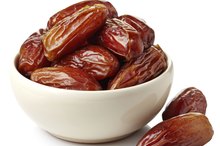What does fact checked mean?
At Healthfully, we strive to deliver objective content that is accurate and up-to-date. Our team periodically reviews articles in order to ensure content quality. The sources cited below consist of evidence from peer-reviewed journals, prominent medical organizations, academic associations, and government data.
The information contained on this site is for informational purposes only, and should not be used as a substitute for the advice of a professional health care provider. Please check with the appropriate physician regarding health questions and concerns. Although we strive to deliver accurate and up-to-date information, no guarantee to that effect is made.
Kidney Stones & Popcorn
Kidney stones are hard deposits that can be composed of calcium oxalate, calcium phosphate, uric acid or struvite crystals, according to the Langone Medical Center. They can range from harmless to painful to eventually causing kidney failure. A healthy diet can lower your risk for developing more stones, and popcorn can be part of a diet for healthy kidneys.
Oxalate Content
You can reduce your risk of forming calcium oxalate kidney stones by eating no more than 40 to 50 mg of oxalates per day, according to the University of Pittsburgh. Popcorn can be part of a low-oxalate diet because each cup provides only 4 mg, according to the Harvard School of Public Health 1. Other low-oxalate snack foods include custard, pudding, crackers, while some high-oxalate foods to avoid include potato chips and most kinds of nuts.
Weight Control
The Health Benefits of Kasha
Learn More
Popcorn may be beneficial because it has only 110 calories per ounce, and it can help you control your weight. Obesity increases your risk for kidney stones, according to MayoClinic.com 2. The recommendation is to get at least half of your grains from whole grain sources.
Dietary Fiber
A high-fiber diet can lower your risk for kidney stones, and popcorn is a good source. An ounce of air-popped popcorn has 4.1 g fiber, or 16 percent of the daily value. Dietary fiber is a phytonutrient that comes from the parts of plant foods that your body cannot digest. The typical American gets less than half of recommended amounts, according to the 2010 Dietary Guidelines. Other good sources include:
- many other whole grains
- fruits
- vegetables
- beans
- lentils
- nuts
- A high-fiber diet can lower your risk for kidney stones, and popcorn is a good source.
- An ounce of air-popped popcorn has 4.1 g fiber, or 16 percent of the daily value.
Sodium and Magnesium
Date Fruits & Kidney Stones
Learn More
MayoClinic.com recommends limiting your sodium intake in order to reduce your risk for kidney stones 2. With only 2 mg sodium per ounce, air-popped popcorn is a low-sodium alternative to salted popcorn or other crunchy snacks, such as salted pretzels, cheese or beef jerky. Air-popped popcorn has 41 mg magnesium, or 10 percent of the daily value. Magnesium, which is also in other whole grains and nuts, is an important nutrient for preventing kidney stones, according to the Langone Medical Center.
- MayoClinic.com recommends limiting your sodium intake in order to reduce your risk for kidney stones 2.
- With only 2 mg sodium per ounce, air-popped popcorn is a low-sodium alternative to salted popcorn or other crunchy snacks, such as salted pretzels, cheese or beef jerky.
Related Articles
References
- Harvard School of Public Health; Oxalate Content of Foods; February 2008
- MayoClinic.com; Kidney Stones; January 2010
- U.S. Department of Health and Human Services; Dietary Guidelines for Americans, 2010; January 2010
- Romero V, Akpinar H, Assimos DG. "Kidney Stones: A Global Picture of Prevalence, Incidence, and Associated Risk Factors." Rev Urol. 2010;12(2-3):e86-96.
Writer Bio
Natalie Stein specializes in weight loss and sports nutrition. She is based in Los Angeles and is an assistant professor with the Program for Public Health at Michigan State University. Stein holds a master of science degree in nutrition and a master of public health degree from Michigan State University.









